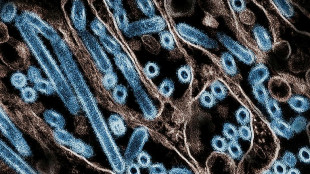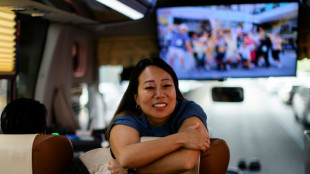
US to impose China Covid testing as virus surge jangles global nerves

The United States and Italy announced mandatory Covid-19 testing for travellers from China as Beijing's sudden abandonment of tough measures to contain the coronavirus -- and surge in virus cases -- caused jitters around the world.
Hospitals and crematoriums across China continue to be overwhelmed by the explosion of Covid cases, which have hit the elderly especially hard.
The winter surge comes ahead of next month's lunar new year holidays, for which hundreds of millions of people are expected to travel to their hometowns to reunite with relatives.
Citing the need to protect Americans' health, the US Centers for Disease Control and Prevention announced that from January 5, all air travellers originating in China will have to provide a new negative Covid test to airlines before they depart.
"The recent rapid increase in Covid-19 transmission in China increases the potential for new variants emerging," a senior US health official told reporters in a phone briefing.
However, the official said, Beijing has provided only limited data about circulating variants in China to global databases, and its testing and reporting on new cases has also diminished.
The US move came after Italy, Japan, India and Malaysia announced their own measures to protect against importing new Covid variants from China.
"I have ordered mandatory Covid-19 antigenic swabs, and related virus sequencing, for all passengers coming from China and transiting through Italy," Italian Health Minister Orazio Schillaci said Wednesday.
Taiwan, a self-ruled island that China claims as its own, also said Wednesday that it would also screen travellers from the mainland for the virus.
And Dirk De fauw, mayor of Bruges, Belgium, which is popular with Chinese tourists, called for Chinese visitors to face Covid tests or mandatory vaccine requirements, the Belga news agency reported.
"The infection rate is still very high. I think we have to work either with a vaccination certificate or with tests," said De fauw.
- Full hospital wards -
Chinese citizens greeted the announcement of the end of Beijing's strict quarantine rules for inbound travellers on Monday by rushing to book international flights.
But on Wednesday, AFP reporters saw dozens of mostly elderly patients lying on gurneys in overflowing hospital emergency wards in Tianjin, 140 kilometres (87 miles) southeast of Beijing.
"Yes, they all have Covid," a doctor told AFP.
Medical staff are "pretty much all" expected to continue working despite testing positive for the virus, one doctor said.
Chinese authorities have said the scale of the outbreak is now "impossible" to track and narrowed the criteria for defining Covid deaths.
- 'Under control' -
Three years after the coronavirus was first detected in the central city of Wuhan, China's loosening of measures effectively brought the curtain down on a zero-Covid regime of mass testing, lockdowns and long quarantines.
While effective, the harsh quarantine regime stalled the Chinese economy and in recent months triggered large-scale nationwide protests.
The policy reversal, coupled with a vastly inadequate vaccination programme, has resulted in cases skyrocketing -- though officially the problem is in hand.
China's Centre for Disease Prevention and Control reported 5,231 new Covid cases and three deaths nationwide Wednesday -- likely a drastic undercount since people are no longer required to declare infections to authorities.
"Currently the development of China's epidemic situation is overall predictable and under control," foreign ministry spokesman Wang Wenbin said Wednesday.
"Hyping, smearing and political manipulation with ulterior motives can't stand the test of facts," Wang added, calling Western media reporting on the Covid surge "completely biased".
- Tracking cases -
The end of mass testing and the decision last week by China's National Health Commission (NHC) to stop releasing an official daily Covid death toll made it harder to understand the extent of the outbreak.
Chinese health authorities are using data from online surveys, hospital visits, demand for fever medicines and emergency calls to "make up for shortcomings in (officially) reported figures", disease control official Yin Wenwu said at a press briefing Tuesday.
With the country facing shortages of basic medicines, Beijing city authorities plan to distribute the oral Covid drug Paxlovid at local hospitals and community clinics. It remains extremely difficult to obtain for ordinary people.
The US-developed treatment was briefly available on e-commerce platform JD.com and delivery platform Meituan in the past few days before both ran out of stock.
(O.Joost--BBZ)

 London
London

 Manchester
Manchester
 Glasgow
Glasgow
 Dublin
Dublin
 Belfast
Belfast
 Washington
Washington
 Denver
Denver
 Atlanta
Atlanta
 Dallas
Dallas
 Houston Texas
Houston Texas
 New Orleans
New Orleans
 El Paso
El Paso
 Phoenix
Phoenix
 Los Angeles
Los Angeles



